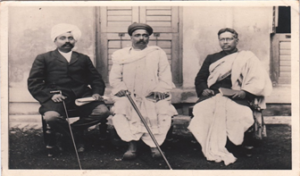Context
Lokmanya Bal Gangadhar Tilak, one of the freedom fighters and the strongest proponent of ‘Poorna Swaraj’ or ‘total self-rule’, Lokmanya Bal Gangadhar Tilak’s 150th birth anniversary was recently observed on 23rd July, 2023.About Bal Gangadhar Tilak:

- He was born on July 23, 1856 in Maharashtra.
- Tilak’s Ideology: “Swaraj is my birth right and I shall have it”.
- Bal Gangadhar Tilak was called ‘father of the Indian unrest” by British colonial rulers.
- Education: Lokmanya Tilak received his education at the Deccan College in Pune and he earned his Bachelor’s degree in 1876, in mathematics and Sanskrit. Later he also studied law at the University of Bombay.
- Educating Commons: He founded the Deccan Education Society in 1884 with an aim to educate common people in English.
- Publications: He founded and edited two newspapers – Kesari in Marathi and The Mahratta in English. He used his pen as a weapon to criticise the colonial rulers.
- Popularization of mass movement: He popularised mass mobilisation programmes like the celebration of Ganesh chaturthi and Shivaji Jayanti to aid to national awakening against the British.
- Swadeshi movement: It was under the leadership of Lal-Bal- Pal, Swadeshi movement gained momentum across the country.
- Strong voice against Bengal partition: The trio also mobilised Indians against the Bengal partition.
- Gita Rahasya: He was imprisoned a number of times including a long stint at Mandalay in Myanmar. During his years in prison, he spent his time reading and writing. He wrote the famous ‘Gita Rahasya’ – an analysis of the Karma Yoga which finds its source in The Bhagavad Gita.
- Home Rule Movement: Tilak was involved in the Home Rule Movement and joined Anne Besant’s Home Rule League. In 1918, he visited England to popularise the Home Rule Movement.
- While Jawaharlal Nehru called him the ‘father of Indian revolution’, Mahatma Gandhi described him as ‘the maker of modern India’.
Lal-Bal-Pal
Tilak who along with Bipin Chandra Pal and Lala Lajpat Rai constituted the ‘Lal-Bal-Pal’ trio of extremist leaders.
 |
- Channelizing of patriotism: Bal Gangadhar Tilak was one of the first revolutionists who not only raised their voice against the British Raj in India but also channelized the patriotism and anguish of the general public towards the unsettling oppression, tyranny and injustice inflicted on Indians under the colonial rule, to the attainment of poorna swaraj (complete independence).
- The Indian National Congress, on 19 December 1929, passed the historic ‘Purna Swaraj’ – (total independence) resolution – at its Lahore session.
- A public declaration was made on 26 January 1930 – a day which the Congress Party urged Indians to celebrate as ‘Independence Day’.
Post Views: 266
